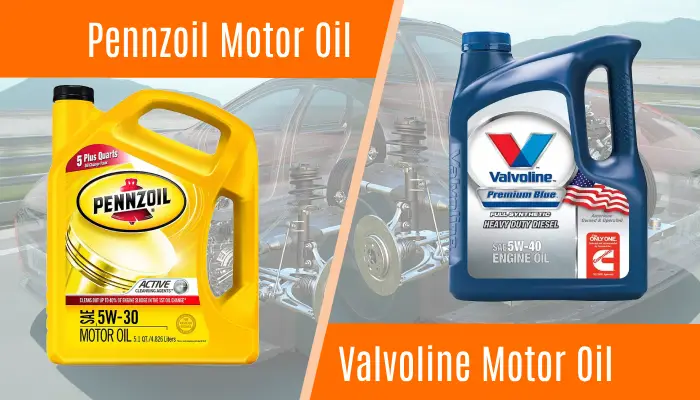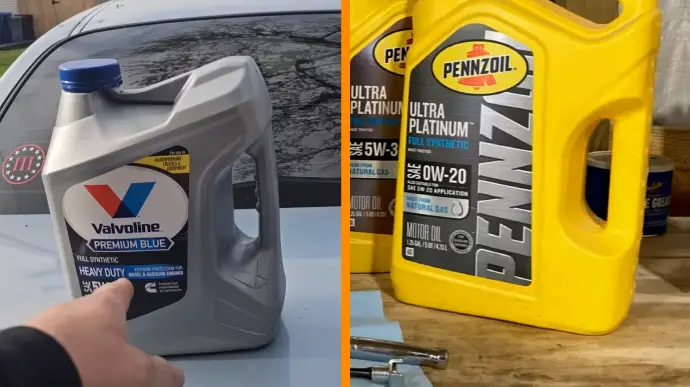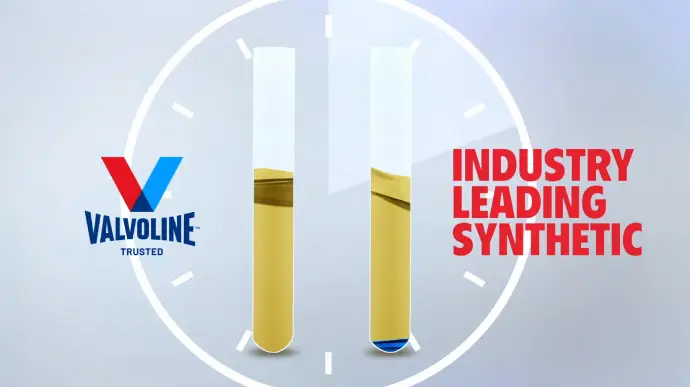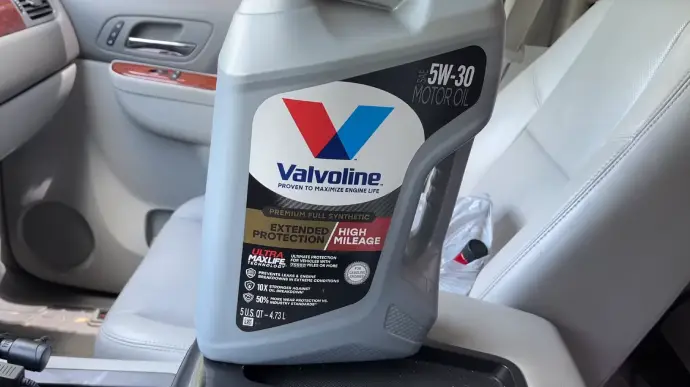Physical Address
304 North Cardinal St.
Dorchester Center, MA 02124
Physical Address
304 North Cardinal St.
Dorchester Center, MA 02124

Picking the right motor oil for your vehicle can significantly affect its performance and longevity. Two prominent contenders in the realm of fully synthetic motor oils are Pennzoil and Valvoline.
Pennzoil excels in retaining viscosity in extreme temperatures and is well-known for its superior sludge protection. This makes it a preferred choice for those facing harsh climate conditions.
In contrast, Valvoline stands out for its low-friction technology and efficient heat dissipation, contributing to enhanced engine efficiency and longevity.
Here, we will explore the key distinctions between Pennzoil and Valvoline motor oil. We aim to empower you with the technical, analytical, and precise information you need to make an informed choice for your engine.

Several key differences have been found in comparing Pennzoil and Valvoline motor oils for vehicles.
You can distinguish the manufacturer and base oils of Pennzoil and Valvoline motor oil for your vehicle by considering their origins and production methods.
Pennzoil is manufactured by the Pennzoil-Quaker State Company, a subsidiary of Shell Oil Company, and it uses base oils from Shell, a major petroleum company.
On the other hand, Valvoline sets itself apart by producing its base oils and additives. This gives Valvoline more control over its product’s formulation than Pennzoil, which relies on off-the-shelf base oils from its parent company, Shell.
Pennzoil is known for its ability to retain viscosity, making it suitable for maintaining oil flow and protection in various climates. This means Pennzoil can provide consistent performance and protection regardless of the weather conditions.
In contrast, Valvoline has a lighter weight, which can impact its performance in extreme climates. In colder climates, the lighter weight of Valvoline may result in improved cold-start performance. However, the lighter weight in hotter climates may lead to increased oil thinning and reduced protection.
This is an important factor, especially if your vehicle has an emission control system that relies heavily on the catalytic converter. The catalytic converter plays a crucial role in reducing harmful emissions.
Anti-wear additives are included in Pennzoil’s formulation to protect engines. However, these additives may not significantly impact catalytic converter performance.
On the other hand, Valvoline incorporates a higher concentration of anti-wear additives. It enhances engine protection but could potentially hinder catalytic converter performance.
Both Pennzoil and Valvoline motor oil offer reliable options to prevent sludge buildup in your vehicle’s engine.
Pennzoil is specifically formulated to provide superior sludge protection, ensuring your engine stays clean and free from harmful deposits. Its advanced additives work to break down sludge and prevent it from forming, keeping your engine running smoothly and efficiently.
In contrast, Valvoline also excels in reducing sludge buildup, making it a trustworthy choice for maintaining the health and longevity of your vehicle’s engine. Its unique formulation helps to prevent sludge from accumulating, ensuring optimal engine performance.
But, it has the extra benefits of preventing corrosion, wear and tear, and varnish buildups. Valvoline also works to keep your engine clean and free of harmful deposits, helping to extend its life.

If you want to understand Pennzoil and Valvoline motor oils’ differences in temperature performance, consider their ability to retain viscosity under extreme conditions.
Pennzoil excels in this aspect, making it a better choice for protecting your engine in both hot summers and cold winters. Your engine oil must retain its viscosity in extreme temperatures to provide proper lubrication and reduce friction.
Meanwhile, Valvoline may not retain viscosity as effectively in extreme temperature conditions. This could impact its performance, especially in harsh climates or engage in heavy-duty driving.
Pennzoil motor oil provides improved fuel economy due to its advanced formulation. It also offers superior wear protection, which helps prolong the life of your engine components.
Additionally, Pennzoil’s piston cleanliness feature ensures that your engine operates at peak performance, reducing the risk of power loss.
On the other hand, Valvoline motor oil stands out with its low-friction technology, which minimizes friction between engine parts and improves overall efficiency. Valvoline also boasts a highly effective detergent system that prevents sediment buildup, ensuring the longevity of your engine.
When comparing their environmental impact, you should evaluate Pennzoil and Valvoline motor oil’s contribution to reduced emissions and fuel consumption.
Pennzoil’s focus on improved fuel economy and reduced engine power loss translates into lower carbon emissions. This means that you can contribute to a cleaner environment by using Pennzoil motor oil.
Alternatively, Valvoline’s low-friction technology and efficient heat dissipation may reduce fuel consumption, which is also favorable for the environment. However, while Valvoline’s features align with environmental concerns, catalytic converter performance impacts are possible.
Consider the cost differences between Pennzoil and Valvoline motor oil for your vehicle.
While Pennzoil is known for being a more cost-effective option, Valvoline tends to have a higher price point. This price difference may be a deciding factor for budget-conscious consumers.
However, it’s important to note that its unique features and performance advantages can justify Valvoline’s higher price. And, when shopping online, you may find discounts for Valvoline motor oil.
| Key Differences | Pennzoil | Valvoline |
| Manufacturer and Base Oils | Manufactured by Pennzoil-Quaker State, a Shell subsidiary, using off-the-shelf base oils from Shell. | Produced by Valvoline Inc., with the unique ability to make its base oils and additives. |
| Weight and Viscosity | Retains viscosity well in extreme temperatures. | It may have a lighter weight that could impact performance in extreme conditions. |
| Anti-Wear Additives and Catalytic Converter Impact | Contains anti-wear additives with potential catalytic converter impact. | Contains more anti-wear additives, which could impact catalytic converter performance. |
| Sludge Buildup Prevention | Offers superior sludge protection for engine cleanliness. | Also excels in reducing sludge buildup for engine health. |
| Temperature Performance | Better at retaining viscosity in extreme temperatures. | It may lose viscosity under extreme conditions. |
| Cost Considerations | Typically more cost-effective, and suitable for budget-conscious consumers. | Slightly higher price point, with added value in performance. |
| Additives and Benefits | Offers improved fuel economy, piston cleanliness, wear protection, and power loss prevention. | Features low-friction technology, and sludge prevention. |
| Independence in Oil Production | Relies on base oils from Shell, providing consistency but less independence. | Makes its base oils and additives, giving more control over formulation. |
| Performance in Independent Tests | Provides reliable performance according to industry standards. | Excels in friction, evaporation, and heat dissipation tests for superior engine efficiency. |
| Price Comparison and Value | Often a budget-friendly option. | Comes at a slightly higher price, justified by added value in performance and features. |
Pennzoil, known for its ability to retain viscosity in extreme temperatures, is particularly suitable for regions with harsh climate conditions. The excellent viscosity retention of Pennzoil ensures that the motor oil maintains its optimal thickness, even in extreme cold or hot climates.
On the other hand, Valvoline may not retain viscosity as well in extreme temperatures, which can impact its performance in your local climate.
For this reason, Pennzoil is your best choice if you live in an area with extreme temperature variations.

You can easily switch from Pennzoil to Valvoline without any negative effects on your vehicle. Pennzoil and Valvoline are high-quality motor oils that meet industry standards and provide excellent engine protection.
The most important factor when switching motor oils is to ensure that the new oil meets the specifications recommended by your vehicle manufacturer. Valvoline offers various motor oils suitable for different vehicles and driving conditions.
Avoid mixing Pennzoil and Valvoline motor oils to ensure optimal engine performance and longevity. Each brand has its unique formulation and additives specifically designed to work together within their respective oil systems.
Combining different motor oils can disrupt this delicate balance and potentially lead to reduced lubrication, increased wear and tear, and decreased engine efficiency.
Valvoline motor oil is made in the United States. As an American retail automotive services company, Valvoline Inc. ensures that its motor oil products are produced domestically. Manufacturing its motor oil in the United States allows Valvoline to maintain strict quality control and adhere to industry standards.
In the realm of motor oil, both Pennzoil and Valvoline stand as reputable choices, each with its unique strengths and advantages.
While Pennzoil boasts reliability, vehicle manufacturer recommendations, and cost-effectiveness, Valvoline shines with its independent test performance, historical significance, and dedication to environmental concerns.
Ultimately, the choice between these two industry leaders comes down to your specific vehicle, driving conditions, and priorities.
Keep in mind that Pennzoil and Valvoline have a long history of serving drivers’ maintenance needs, providing a reliable way to protect and optimize your engine. So, make an informed decision based on your vehicle’s needs and the climate you drive in.
Last update on 2025-07-03 / Affiliate links / Images from Amazon Product Advertising API